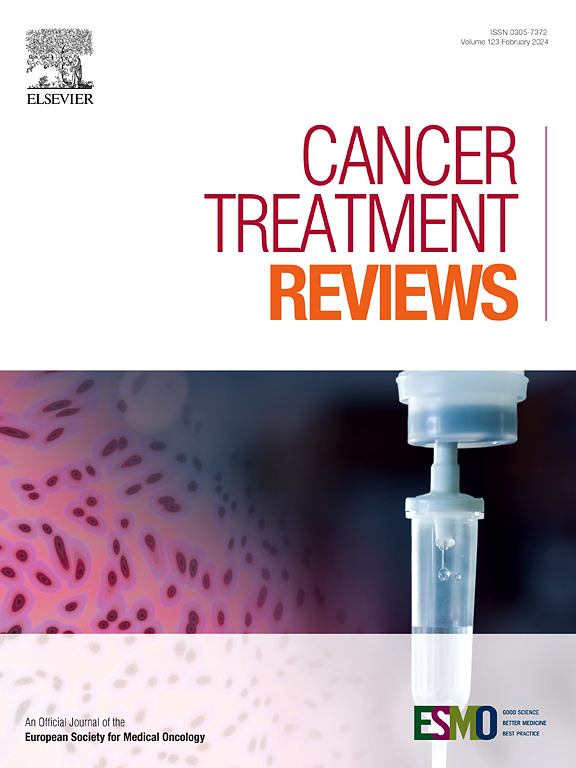针对儿童肾上腺皮质癌:分子的见解和新兴的治疗策略
IF 9.6
1区 医学
Q1 ONCOLOGY
引用次数: 0
摘要
小儿肾上腺皮质癌(pACC)是一种异常罕见的侵袭性恶性肿瘤,仅占儿童癌症的 0.2-0.3%。与成人肾上腺皮质癌(ACC)相比,小儿肾上腺皮质癌的特点是具有明显的内分泌活性,而且往往与遗传综合征(如李-弗劳米尼综合征)有关,在临床和分子特征方面表现出与成人肾上腺皮质癌截然不同的特点。目前的治疗方法主要沿用成人方案,以手术和化疗(包括米托坦)为中心。分子图谱分析的进展揭示了可操作的靶点,如 Wnt/β-catenin 和 MAP/ERK 通路的改变、IGF2 的过度表达以及表观遗传失调。包括免疫检查点抑制剂、CAR T 细胞疗法和放射性药物在内的新兴疗法前景广阔,但在儿科人群中基本上仍未得到验证。针对代谢弱点(如类固醇生成和脂质代谢)的疗法为治疗创新提供了更多途径。此外,液体活检和类固醇分析等诊断工具的改进可加强疾病监测和早期检测。尽管在了解 pACC 生物学方面取得了进展,但要将这些见解转化为有效的治疗方法仍面临巨大挑战。欧洲儿科罕见肿瘤合作研究小组(EXPeRT)等合作机构的努力以及儿科特定临床试验的发展对于推动该领域的发展至关重要。多学科治疗和国际研究计划对于满足儿童罕见肿瘤患者尚未得到满足的需求至关重要。通过利用分子洞察力和促进全球合作,该领域可以向个性化医疗迈进,改善这一具有挑战性疾病患儿的治疗效果和生活质量。扩大临床试验、完善诊断工具并将新型疗法纳入治疗方案,对于缩小儿童和成人 ACC 治疗成功率之间的差距至关重要。本文章由计算机程序翻译,如有差异,请以英文原文为准。
Targeting pediatric adrenocortical carcinoma: Molecular insights and emerging therapeutic strategies
Pediatric adrenocortical carcinoma (pACC) is an exceptionally rare and aggressive malignancy, accounting for only 0.2–0.3% of childhood cancers. Characterized by significant endocrine activity and often associated with genetic syndromes such as Li-Fraumeni syndrome, pACC exhibits distinct clinical and molecular profiles compared to adult adrenocortical carcinoma (ACC). Current treatment approaches, largely adapted from adult protocols, center on surgery and chemotherapy, including mitotane. However, the lack of pediatric-specific data and major clinical trials underscores a pressing need for tailored therapeutic strategies.
Advances in molecular profiling have unveiled actionable targets, such as alterations in the Wnt/β-catenin and MAP/ERK pathways, overexpression of IGF2, and epigenetic dysregulation. Emerging therapies, including immune checkpoint inhibitors, CAR T-cell therapy, and radiopharmaceuticals, hold promise but remain largely untested in pediatric populations. Targeting metabolic vulnerabilities, such as steroidogenesis and lipid metabolism, offers additional avenues for therapeutic innovation. Furthermore, improved diagnostic tools like liquid biopsy and steroid profiling may enhance disease monitoring and early detection.
Despite progress in understanding pACC biology, significant challenges remain in translating these insights into effective treatments. Collaborative efforts, such as the European Cooperative Study Group for Pediatric Rare Tumors (EXPeRT), and the development of pediatric-specific clinical trials are vital for advancing the field. Multidisciplinary care and international research initiatives will be pivotal in addressing the unmet needs of pACC patients.
By leveraging molecular insights and fostering global collaboration, the field can move toward personalized medicine, improving outcomes and quality of life for children with this challenging disease. Expanding clinical trials, refining diagnostic tools, and integrating novel therapies into treatment regimens will be critical in bridging the gap between pediatric and adult ACC treatment success.
求助全文
通过发布文献求助,成功后即可免费获取论文全文。
去求助
来源期刊

Cancer treatment reviews
医学-肿瘤学
CiteScore
21.40
自引率
0.80%
发文量
109
审稿时长
13 days
期刊介绍:
Cancer Treatment Reviews
Journal Overview:
International journal focused on developments in cancer treatment research
Publishes state-of-the-art, authoritative reviews to keep clinicians and researchers informed
Regular Sections in Each Issue:
Comments on Controversy
Tumor Reviews
Anti-tumor Treatments
New Drugs
Complications of Treatment
General and Supportive Care
Laboratory/Clinic Interface
Submission and Editorial System:
Online submission and editorial system for Cancer Treatment Reviews
 求助内容:
求助内容: 应助结果提醒方式:
应助结果提醒方式:


